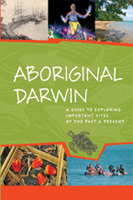Aboriginal Darwin: A guide to exploring important sites of the past and present
Summary
To most visitors and locals, Darwin is a vibrant, tropical city in the Top End. Although not always obvious to visitors, Darwin is also a living Aboriginal cultural landscape. Aboriginal Darwin peels back layers to show the rich heritage and complex cultures of Aboriginal people, both before and since colonisation. It includes contemporary and historical sites that range from the harbour to the beaches, monsoon forests, gardens, parks, camping places, exhibitions, cultural displays and buildings in the CBD, supplemented by information about sites not accessible to visitors.
Beautifully illustrated, Aboriginal Darwin’s easy-to-use layout allows users to explore at their own pace.
There are as many ways of seeing Aboriginal Darwin as there are Aboriginal people. Aboriginal Darwin provides insights into the enormous economic, cultural, social and historical contributions of Aboriginal people to the city.
Toni Bauman is a social anthropologist, mediator and facilitator. She’s the author of the successful Always ask, a guide to Aboriginal communities.
Reviews and endorsements
Bauman has produced an insightful and sensitive guide to Aboriginal culture, with a section on responsible travel including rules on visiting communities. For visitors wanting to open the door to indigenous culture in the Top End's tropical city, this book is a key.
— Genevieve Swart, Sun Herald, March 18, 2007
'Aboriginal Darwin...goes some way to uncovering the indigenous experience of recent decades. It is a poignant, disturbing book, much concerned with absences and erasures of evidence.'
— Nicolas Rothwell, The Australian, February 2007
'With the knowledge of cultural protocols and local history provided by Aboriginal Darwin and the courage it demonstrates to step beyond the limitations of an introductory guided tour, intending visitors to Darwin can prepare themselves well for what could be a memorable encounter with Indigenous Australia.'
— William B Day, Anthropological Forum, Vol. 18, No. 2, July 2008
'Aboriginal Darwin acts as both a guidebook that casts a local eye across the town and a social history of the Larrakia people and their eventual neighbours. There are stories of resistance as well as co-operation: the Larrakia, after all, were sometimes quite happy to join forces with white settlers to drive away rival tribes. Issues such as problems among itinerant ‘long grassers’ and a smorgasbord of batty race-based government policies are dealt with in a matter-of-fact way, but the overall feel is upbeat.'
— James Jeffrey, The Australian, 19 July 2007
